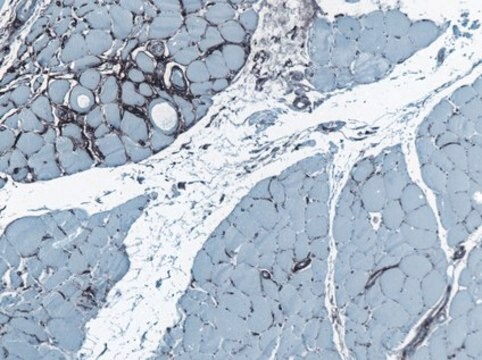MBD0020
DAPI-Fertiglösung mit Antifade
For Nuclear counterstain in Fluorescence Microscopy
Synonym(e):
4′,6-Diamidin-2-phenylindol -dihydrochlorid, 2-(4-Amidinophenyl)-6-indolcarbamidin -dihydrochlorid, DAPI -dihydrochlorid
About This Item
Empfohlene Produkte
Qualitätsniveau
Form
liquid
Lagerbedingungen
protect from light
Methode(n)
DNA extraction: suitable
DNA sequencing: suitable
PCR: suitable
Fluoreszenz
λex 340 nm; λem 488 nm (nur DAPI)
λex 364 nm; λem 454 nm (DAPI-DNA-Komplex)
Eignung
suitable for nucleic acid staining
Versandbedingung
dry ice
Lagertemp.
−20°C
SMILES String
Cl.Cl.NC(=N)c1ccc(cc1)-c2cc3ccc(cc3[nH]2)C(N)=N
InChI
1S/C16H15N5.2ClH/c17-15(18)10-3-1-9(2-4-10)13-7-11-5-6-12(16(19)20)8-14(11)21-13;;/h1-8,21H,(H3,17,18)(H3,19,20);2*1H
InChIKey
FPNZBYLXNYPRLR-UHFFFAOYSA-N
Suchen Sie nach ähnlichen Produkten? Aufrufen Leitfaden zum Produktvergleich
Allgemeine Beschreibung
Anwendung
Biochem./physiol. Wirkung
Leistungsmerkmale und Vorteile
- Protects dyes from fading during imaging.
- Ready-to-use liquid.
- Easy to use Dropper vial application.
- Stained sample are stable for longer time period.
- Maintains fluorescence signal-little to no quenching.
Physikalische Form
H-Sätze
P-Sätze
Gefahreneinstufungen
Aquatic Chronic 3
Lagerklassenschlüssel
10 - Combustible liquids
WGK
WGK 2
Flammpunkt (°F)
Not applicable
Flammpunkt (°C)
Not applicable
Analysenzertifikate (COA)
Suchen Sie nach Analysenzertifikate (COA), indem Sie die Lot-/Chargennummer des Produkts eingeben. Lot- und Chargennummern sind auf dem Produktetikett hinter den Wörtern ‘Lot’ oder ‘Batch’ (Lot oder Charge) zu finden.
Besitzen Sie dieses Produkt bereits?
In der Dokumentenbibliothek finden Sie die Dokumentation zu den Produkten, die Sie kürzlich erworben haben.
Kunden haben sich ebenfalls angesehen
Artikel
An overview of human microbiome research, workflow challenges, sequencing, library production, data analysis, and available microbiome reagents to support your research.
Unser Team von Wissenschaftlern verfügt über Erfahrung in allen Forschungsbereichen einschließlich Life Science, Materialwissenschaften, chemischer Synthese, Chromatographie, Analytik und vielen mehr..
Setzen Sie sich mit dem technischen Dienst in Verbindung.








